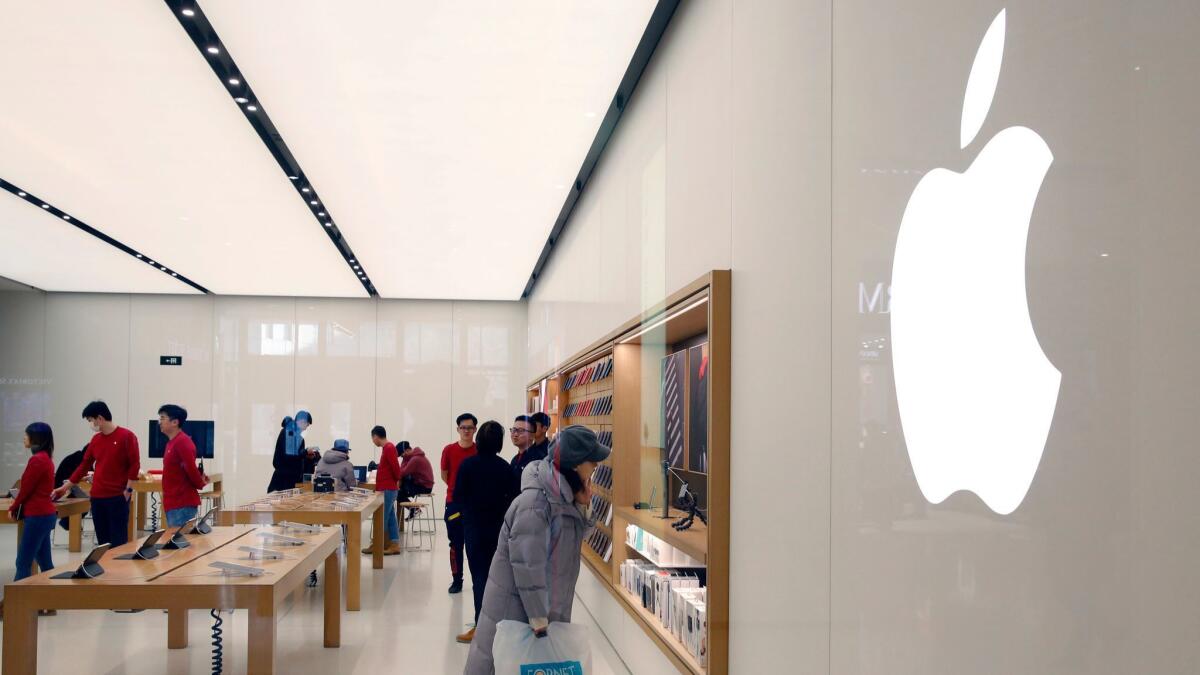First airlines, now Apple: China wants 66 more multinationals to state self-ruled Taiwan is part of its country

- Share via
Chinese authorities are pressuring 66 multinational companies, including American icons Apple and Nike, to refer to self-ruled Taiwan as part of China, a demand expected to drive a new wedge between two governments that already struggle to get along.
The change in wording would send a message to Taiwan that major companies regard it as part of Chinese territory. Most Taiwanese say in opinion surveys that they prefer today’s autonomy, but the more economically powerful China says Taiwan belongs under its flag.
The companies would probably comply by linking Taiwan to China on store-finder websites and in descriptions of their international operations, analysts in Taipei said. They’re all among the world’s top 500 and many do business in China.
“At this point, to struggle against the hearts of Taiwan’s people is unhelpful and can instead be harmful,” said Andy Chang, China studies professor at Tamkang University in Taiwan. “These companies are not government organizations, so for mainland China to demand they take a crystal clear position on politics, of course, doesn’t form a good image among Taiwan’s people or internationally.”
The mandate to companies, noticed this week by the Taiwan government, follows a similar request last year of 44 international airlines. Despite protests from foreign governments, including the United States, most airlines met China’s final July 25 deadline by ensuring their booking websites did not imply Taiwan is separate from China.
China made the most recent requests in its 2018 Blue Book on the Cyber Rule of Law, which threatens penalties against multinationals that don’t comply, Taiwan’s foreign affairs ministry said Thursday.
China and Taiwan have been separately ruled since the Chinese civil war of the 1940s, when Chiang Kai-shek’s Nationalists lost to the Communists and rebased on the island. China insists that the two sides eventually unite.
Chinese President Xi Jinping called earlier this month for a unification scheme that gives Taiwan some local autonomy, but Taiwan President Tsai Ing-wen later rejected that idea as well as Beijing’s condition that both sit down for talks as parts of one China. Beijing has used military aircraft flybys and diplomatic pressure to make Tsai accept that condition since she took office in 2016.
“The further they push us, the further away we get,” Taiwan legislator Lee Chun-yi said.
Making companies associate Taiwan under China on websites will further hurt relations between the two governments, the ministry said. More than 70% of Taiwanese say in government surveys since 2014 they prefer self-rule over unification with China. The ministry urged multinationals to resist Chinese pressure.
“China’s moves to impose its executive and judicial jurisdiction as well as political ideology on foreign companies not only expose its malicious intent in using political tactics to interfere with private enterprises, but also violate the spirit of free international commerce,” the ministry said in a statement.
Young people in China and Taiwan, who already trade harsh language online, might get even angrier now, said Joanna Lei, chief executive with the Taiwan-based Chunghua 21st Century think tank.
The airlines adjusted ticketing websites and other web content over a period of about six months. They valued China’s civil aviation market, which the International Air Transport Assn. industry group expects to become the world’s largest by 2024 with more than 1 billion passengers per year.
Apple has seen its coveted smartphone market share in China fall below 10% since the second quarter of last year, according to data from Counterpoint Research. Nike would fret about holding onto $1.5 billion in China sales in the 2017-2018 financial year, up from $1.1 billion in the previous year, according to the ISPO Sports Business Network.
Siemens, a German conglomerate also on the list of multinationals, earned $9.2 billion in China revenue over the year ending Oct. 1 and calls itself one of the biggest foreign investors in the country. Spokespeople for Apple, Nike and Siemens did not answer requests for comment.
China probably expects more political gain at home than from Taiwan, Chang said. Its own citizens want stronger action on China’s offshore relations as the country has lost ground with the United States over trade over the past year, he said.
Companies named by China now will likely spend longer than the airlines did to re-label Taiwan, said Liang Kuo-yuan, president of the Taipei research organization Polaris Research Institute. American officials could use the trade dispute as clout to protest China’s demands, he said, but eventually “I believe these private companies will, of course, make the adjustments.”
Jennings is a special correspondent.
More to Read
Sign up for Essential California
The most important California stories and recommendations in your inbox every morning.
You may occasionally receive promotional content from the Los Angeles Times.










